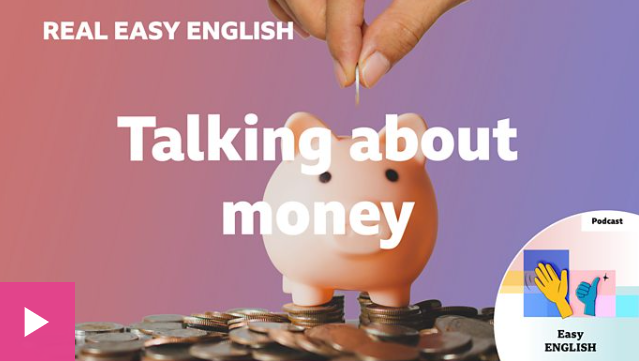Introduction
Neil and Georgie have a real conversation in easy English about saving and spending. Learn to talk about how you use your money.
Vocabulary
save
keep money to spend in the future
save up for/save for
keep money to spend on a specific item in the future
(be able to) afford
have enough money to buy something
stingy
used to describe someone who doesn’t like spending their money or isn’t generous
break the bank
cost too much money
splash out
spend a lot of money on luxurious items
Transcript
Georgie
Hello and welcome to Real Easy English, the podcast where we have real conversations in easy English to help you learn. I’m Georgie.
Neil
And I’m Neil. And you can read along with this podcast and find a worksheet to help you on our website, bbclearningenglish.com.
Georgie
Hi, Neil. How’s your week going?
Neil
Very well, Georgie. How are you?
Georgie
Yes, I’m pretty good, thank you.
Today we’re going to talk about money. We’ll talk about how much things cost and learn some useful vocabulary about money.
Neil
OK. Everybody likes talking about money so let’s get started.
Georgie
Neil, do you like to save or spend your money?
Neil
I like to do both of those things. I like to save if there’s something that I want. But I don’t like to save just for savings, for the sake of saving. And I do also like spending money because that’s what it’s for. So how about you?
Georgie
I think I have quite a good balance as well. I don’t feel too guilty about spending money. But I also like saving for things. What are you saving for at the moment?
Neil
I’m always saving for a holiday. So, next October, a while away, I’m going on a holiday with my family and I need to start saving or we can’t go.
Georgie
Yeah. And you have to save for your whole family as well.
Neil
I know.
Georgie
That’s quite hard.
Neil
Absolutely. Yeah. Are you saving for anything?
Georgie
I am also saving for a holiday. I want to do a big trip in November around my 30th birthday. I’m looking at trips to Peru, actually.
Neil
Are you generous with your money?
Georgie
I try to be. If I can, I try to be. I give monthly to charity. And at one point, I wasn’t paying rent where I lived. And in that period, I was much more generous with buying my friend’s drinks or paying for meals and things like that. So, if I, if I had a lot of money, I would definitely be generous.
Neil
OK.
Georgie
What about you? No one wants, no one wants to say they’re not generous.
Neil
I actually don’t like when people don’t like spending money. I understand, obviously, that some people have more money than others, but I think you find a lot of people who don’t have very much money are often more generous than people with a lot of money.
Georgie
Yes, I agree. We have a word for that, don’t we? Do you know the one I’m thinking of?
Neil
Tell me.
Georgie
Stingy.
Neil
Yes.
Georgie
Someone who has a lot of money but doesn’t like to… is not generous with it.
Neil
Yeah.
Georgie
So, Neil, is there anything that you really want to buy or do that you can’t afford at the moment? That means you don’t have enough money to buy it?
Neil
Yes. I want to go to Japan on holiday so my wife and my children can meet that side of the family. But to go to Japan for a whole, a whole family to go to Japan from the UK is very expensive. It will break the bank if we go.
Georgie
What does break the bank mean?
Neil
It means it will cost so much it will cause me problems.
Georgie
Well sometimes you have just got to splash out. Life is short.
Neil
That’s true. Have you splashed out on something recently, Georgie?
Georgie
Have I splashed out? Well, actually, next week, I’m going to splash out a lot because it’s a friend’s birthday, and they’ve made a big plan. They want to do an escape room, dinner and cocktails, and I’m quite worried about it because we’re all going to be splashing out.
Neil
You are! That’s going to break the bank.
Georgie
It will. I definitely can’t afford it.
OK, let’s recap the language we heard during the conversation. We had save, keep money to use in the future. We can also say save up for something. For example, I’m saving up for my trip to Peru.
Neil
And we also had afford. So afford means to be able to buy something because you have enough money for it. For example, I can’t afford to go to Japan. It’s too expensive.
Georgie
We had the expression break the bank, which means something costs too much. For example, Neil’s trip to Japan will break the bank.
Neil
And we also had the adjective stingy, which describes someone who doesn’t like spending their money. It’s the opposite of generous.
Georgie
And we had splash out, which is a phrasal verb which means to spend a lot on luxurious things.
Neil
And you’ve made a video on phrasal verbs, haven’t you, Georgie?
Georgie
Yes, you can search for Phrasal verbs with Georgie. And this video is about money. You can find it on our website, bbclearningenglish.com.
Neil
Next time we’ll be talking about what we do in the mornings and learn language about daily morning routines.
Georgie
See you then.
Neil
Goodbye.
